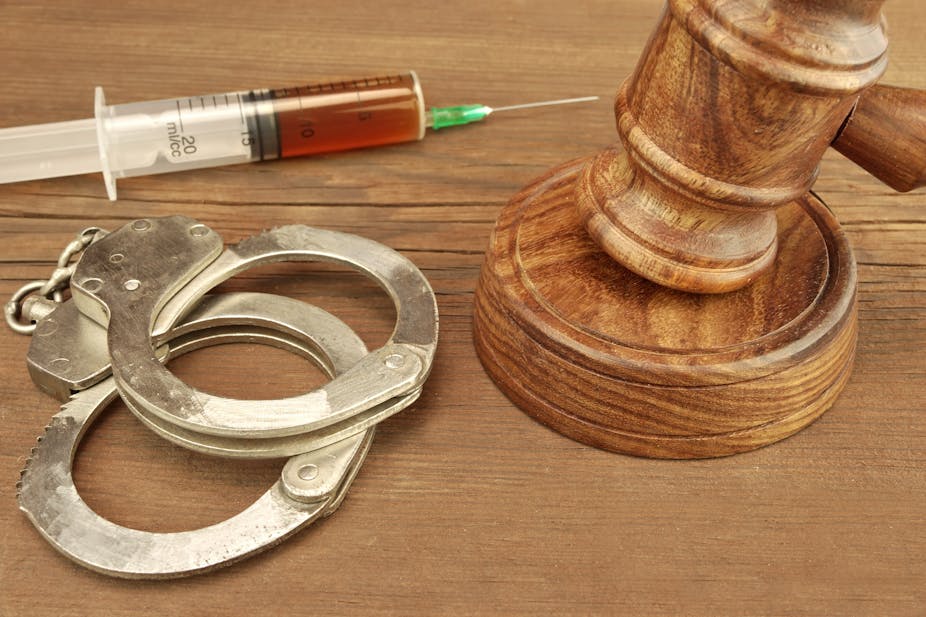Indonesia’s “war on drugs” is jeopardising years of hard work by civil society and public health sector to provide harm-reduction interventions. These have successfully reduced rates of HIV prevalence and other blood-borne illnesses among injecting drug users.
If Indonesia does not shift from its criminalisation and punitive approach to a public health approach in tackling the problem of drug abuse, it may face a larger health crisis in coming years.
A futile war
Last year, Indonesian President Joko Widodo declared a drug emergency and carried out executions of convicted drug dealers, including reformed Australians Andrew Chan and Myuran Sukumaran.
The National Narcotics Agency (BNN) has since continued the “war against drugs”, targeting not only drug producers, dealers and couriers but also users.
Newly appointed BNN chief Budi Waseso recently announced that drug users have until January to turn themselves into government-run rehabilitation centres. They face prosecution if caught next year, although the centres are not ready to provide necessary services.
BNN’s strategy is expensive and does not work. The annual budget of over IDR1.3 trillion is mostly allocated to supply reduction, which involves police arrests and seizure of narcotics.
BNN’s own estimates suggest it will only be able to seize 10% of the estimated supply of illegal drugs in the market.
The demand-reduction strategy has been marginalised and underfunded. In any case, forced rehabilitation is not effective in reducing demand for illegal drugs. It reinforces stigma and discrimination against drug users, destroying their chance to live a productive future life.
BNN was born to address public health crisis
It is unfortunate that Indonesia decided to have the police force spearhead BNN. The idea to set up an agency to solve the drug problems in Indonesia actually came from the civil society and health sector in 1999, in response to the HIV epidemic. At the time, injecting drug users contributed more than 80% of reported cases.
HIV and AIDS activists requested the then-president, B.J. Habibie, to establish a special agency to address this problem. Habibie responded by creating a national coordinating narcotics body.
We envisioned public health to be the agency’s priority, with policing as part of the mission. However, for some reason, the police was mandated to chair the coordinating body. When Megawati Soekarnoputri became president in 2002, she transformed the coordinating body into a armed agency, which became what is now BNN.
Activists withdrew their participation in BNN and organised their own response. Harm-reduction programs aim to reduce the negative consequences of drug use through practical strategies with respect for the rights of people who use drugs.
With Atma Jaya Catholic University of Indonesia, I set up Kios Informasi Kesehatan as a health extension that reaches out to drug users. The aim is to reduce risks by educating them on how to clean their syringes or by providing them with clean needles.
In 2006, the Indonesian health minister issued a decree supporting harm-reduction programs and scaled up its interventions in other cities.
Repercussions of criminalisation of drug users
During the leadership of former BNN chief Anang Iskandar, harm-reduction programs received internal BNN support. He acknowledged that drug users are patients, not criminals.
As a result, HIV prevalence rates among injecting drug users continued to drop from 42% in 2011 to 36% in 2013.
But this investment in providing support for drug users will be lost with intensifying crackdowns on users. It will push users “underground” for fear of being followed and arrested if seeking our services.
A recent documentary, Dying a Slow Death: Inside Indonesia’s Drug War by the Indonesian Drug Users Network and Hungarian Drugreporter, shows how the drug war impacts the community.
The crackdowns may also raise the price of heroin in the market. For desperate poor addicts, this will drive them to seek out cheaper and more dangerous illegal drug options.
Already, Indonesia has seen a case of poisoning from Desomorphine, also known as Crocodile. The drug, a cheap substitute for heroin, is a highly addictive and dangerous substance that cause the user’s body to rot from the inside.
Associating drug use with morality
Perhaps the biggest problems in tackling drug abuse are the lack of common sense and a negatively skewed perception of drug users.
Evidence of the health gains from harm-reduction interventions are irrefutable. But these are often dismissed due to an entrenched view in the society that sees drugs as morally bad. Hence, we conclude anyone using the substance is morally deficient.
The enemies of society are the drug producers and dealers. But they represent less than 3% of the people in our prison cells. Drug users and couriers, who often come from the most marginalised groups in society, are overrepresented.
The power vested in the government should be used to save the lives of the victims and punish drug producers and traffickers.

